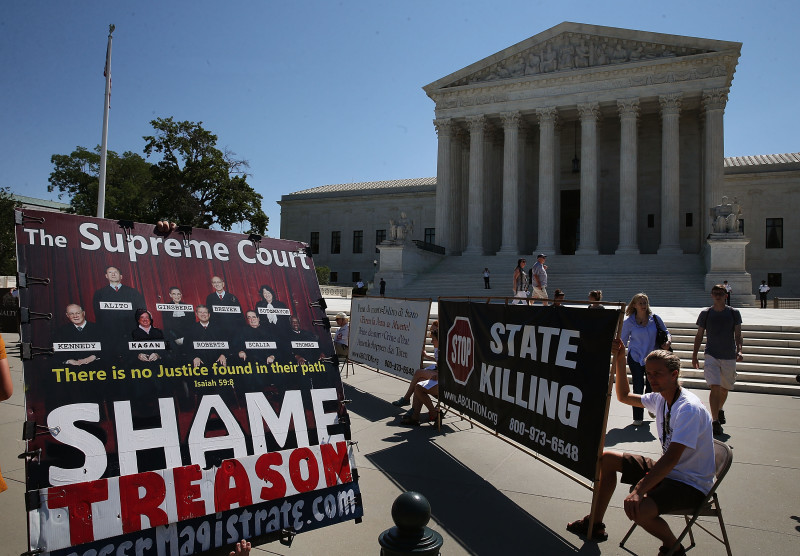Justice Samuel Alito said for a conservative majority that arguments the drug could not be used effectively as a sedative in executions were speculative and he dismissed problems in executions in Arizona and Oklahoma as "having little probative value for present purposes."
In a biting dissent, Justice Sonia Sotomayor said, "Under the court's new rule, it would not matter whether the state intended to use midazolam, or instead to have petitioners drawn and quartered, slowly tortured to death, or actually burned at the stake."
Alito responded, saying "the dissent's resort to this outlandish rhetoric reveals the weakness of its legal arguments."
In a separate dissent, Justice Stephen Breyer said the time has come for the court to debate whether the death penalty itself is constitutional. Justice Ruth Bader Ginsburg joined Breyer's opinion.
"I believe it highly likely that the death penalty violates the Eighth Amendment," Breyer said, drawing on cases he has reviewed in more than 20 years on the Supreme Court bench.
More than 100 death row inmates have been exonerated, showing that the death penalty is unreliable, Breyer said. He said it also is imposed arbitrarily, takes far too long to carry out and has been abandoned by most of the country. Last year, just seven states carried out executions, he said.
The two senior liberal justices joined retired Justice John Paul Stevens, who was in the courtroom Monday, and Justice Harry Blackmun in late-career pronouncements calling into question the use of the death penalty, although Breyer and Ginsburg stopped short of declaring their outright opposition to capital punishment.
In 1972, the Supreme Court struck down every state's death penalty laws. Some justices believed at the time that this decision effectively would end capital punishment.
Instead, many states wrote new laws, and four years later the court reinstated the death penalty, a decision in which Stevens joined.
In an extremely unusual turn Monday, four justices read their opinions from the bench in the lethal execution case. Justice Antonin Scalia, part of the court's majority, read a brief reply to Breyer. "Welcome to Groundhog Day," Scalia said, noting that the court has repeatedly upheld the use of capital punishment.
Scalia used Breyer's own words to complain that the liberal justices were willing to discard long-settled principles in a term in which the left side of the court won most of the closely contested cases, though not the lethal injection dispute. "It is not often in the law that so few have so quickly changed so much," Scalia said. Breyer employed those exact words several years ago at the end of a term in which the conservative justices frequently prevailed.
The Oklahoma case has been especially contentious from the start. The Supreme Court became involved in January with an unusually public disagreement among the justices over executions.
Then, the court refused to block Oklahoma inmate Charles Warner's execution despite the objections of the four liberal justices. In a strongly worded dissent for the four, Sotomayor said, "The questions before us are especially important now, given states' increasing reliance on new and scientifically untested methods of execution."
Eight days later, the justices agreed to hear the case of three other Oklahoma death row prisoners. It takes just four votes among the nine justices to agree to hear a case, but five votes to place a hold on an execution.
When the case was argued in late April, the justices engaged in combative exchanges and impassioned debate about capital punishment more generally.
Among the conservatives, Alito said death penalty opponents are waging a "guerrilla war" against executions by working to limit the supply of more effective drugs. On the other side, liberal Justice Elena Kagan contended that the way states carry out most executions amounts to having prisoners "burned alive from the inside."
In 2008, the court upheld Kentucky's use of a three-drug execution method that employed a barbiturate as the first drug, intended to render an inmate unconscious. But because of problems obtaining drugs, no state uses the precise combination at issue in that case.
Four states have used midazolam in executions: Arizona, Florida, Ohio and Oklahoma. Also, Alabama, Arkansas, Louisiana and Virginia allow for midazolam but have not used it in executions.
Last April's execution of Clayton Lockett was the first time Oklahoma used midazolam. Lockett writhed on a gurney, moaned and clenched his teeth for several minutes before prison officials tried to halt the process. Lockett died after 43 minutes.
Executions in Arizona and Ohio that used midazolam also went on longer than expected as inmates gasped and made other noises before dying.
Meanwhile, the court challenge has prompted Oklahoma to approve nitrogen gas as an alternative death penalty method if lethal injections aren't possible, either because of a court ruling or a drug shortage.
